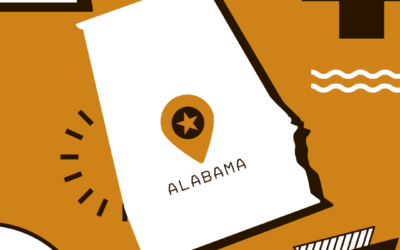Do you need to collect and remit sales tax in New Jersey?
In New Jersey, sales tax is imposed on the sale of tangible personal property, specified digital products, and certain services. The state follows a destination-based sales tax system, meaning the tax rate is determined by the location where the buyer takes possession of the item or where it is delivered.
However, there are exemptions to some New Jersey areas and sales. For example, Urban Enterprise Zones, (which are economically distressed cities within the state), can charge sales tax at half of the state rate if they have a UZ-2 certificate. Only businesses that are in these zones can obtain a UZ-2 certificate.
Some sales and products are also exempt from New Jersey sales tax. Here are just a few:
- Disposable paper products for household use
- Groceries, (which the exemption of candy and soft drinks, which are taxable)
- Prescription and over-the-counter drugs
- Medical equipment for home use
- Prosthetic devices
You can find an exhaustive list of New Jersey’s taxable and non-taxable items and services here.
Do you have sales tax nexus in New Jersey?
Sales tax nexus refers to the connection a business has with a state that requires them to collect and remit sales tax. Nexus can be established through physical presence such as having a store, warehouse, or employees in the state. It can also be determined through economic presence, which is typically based on sales revenue or transaction volume. In New Jersey, businesses with either a physical or economic presence must collect and remit sales tax to the state.
Physical sales tax nexus in New Jersey
Here are some examples of physical nexus in New Jersey:
- Maintaining an office, service enterprise, or other place of business in New Jersey
- Have employees, independent contractors, agents, or other representatives working in the state
- Parking, storing, or garaging motor vehicles in the state
- Delivering goods sold in the seller’s own vehicle
Economic sales tax nexus in New Jersey
If an online or remote seller sells physical items or taxable services in New Jersey without a physical location or presence in the state, they will have economic nexus if they meet either of these two economic thresholds:
- Gross revenue exceeding $100,000 in the current or previous calendar year
- Selling goods or services (both taxable and nontaxable) in 200 or more separate transactions in the current or previous calendar year
Determining nexus for your business can be a complex and daunting task. With many factors to consider, businesses struggle to navigate the intricacies of nexus determination, and even end up paying thousands of dollars to accounting firms to get answers. That’s why we offer nexus determination as an a-la-carte or package deal for businesses at affordable prices. With over 20 years of experience in federal and state tax and accounting laws, we’re a trusted partner for many businesses in need of nexus review services. Contact us now for a consultation!
Are marketplace facilitators required to collect and remit sales tax in New Jersey?
In New Jersey, laws set in 2018 require marketplace facilitators to collect and remit sales tax on behalf of remote sellers for transactions made through their platforms. This means that if you are a remote seller selling tangible personal property, specified digital products, or taxable services in New Jersey through a marketplace, you are not required to collect and remit sales tax on those sales, as the facilitator is responsible for doing so. These laws are in place to simplify the sales tax collection process and ensure that the appropriate taxes are collected and remitted.
However, even if you only sell through a marketplace facilitator, it doesn’t mean that you have no New Jersey sales tax responsibilities. The economic nexus thresholds placed for remote sellers include sales made through a marketplace facilitator. When calculating whether you have economic nexus in New Jersey, you must include marketplace facilitator sales. If you sell solely through a facilitator and exceed one of the economic thresholds, you must still register with New Jersey, but you can request to be placed on a non-reporting basis by completing Form C-6205-ST.
What Platforms Are Marketplace Facilitators?
What is a marketplace facilitator?
A marketplace facilitator, sometimes referred to as a Multivendor Marketplace Platform (MMP), is an online platform that allows customers to purchase goods or services from various vendors in one convenient location. These platforms can benefit businesses by increasing product visibility and attracting a larger customer base. Additionally, marketplace facilitators often have the legal responsibility to collect and remit sales tax on behalf of sellers, which can help ease the sales tax burden for businesses.
Filing New Jersey Sales Tax
The sales tax process in New Jersey involves registering your business, obtaining a sales tax certificate, understanding tax rates and exemptions, collecting sales tax, filing and paying sales tax returns, and maintaining accurate records. Take a look at the table below for a breakdown of these steps so you can stay compliant with New Jersey sales tax laws.
| Step | Description | Resources |
| 1. Register for a New Jersey Sales Tax Certificate | Register for a New Jersey Sales Tax Certificate by either completing the online application through the NJ Division of Revenue and Enterprise Services, registering with Streamlined Sales Tax (SST) if you need to register with multiple states, or using an outsourcing service to handle the registration for you (like us). You will receive a Business Registration Certificate with you sales tax ID number. | New Jersey Online Business Registration; Streamlined Sales Tax; SalesTaxSolutions Registration Services |
| 2. Understanding Sales Tax Rates and Exemptions | Refer to this guide for an overview of New Jersey’s sales tax laws and rates, as well as NJ’s own Sales Tax Guide. | New Jersey Sales Tax Guide |
| 3. Collecting sales tax | Collect sales tax from customers based on the location where the buyer takes possession of the item or where it is delivered. Sales tax must be separately stated on any sales slip, invoice, receipt, or other statement of price or payment. | |
| 4. Filing and paying sales tax returns | New Jersey sales tax returns must be filed and paid electronically through the NJ Division of Taxation’s online service. Returns are due quarterly, but monthly prepayments may need to be made depending on your sales volume. | New Jersey Online Filing System |
| 5. Maintaining Accurate Records | Keep accurate records of all sales transactions, tax collected, and sales tax returns filed for at least four years. |
Tips and Best Practices
- Regularly review your sales tax obligations and ensure you are collecting and remitting the appropriate amounts.
- Consider using a sales tax software or outsource your sales tax obligations.
- Consult with a tax professional for guidance on your specific situation and to stay up-to-date on any changes in tax laws or regulations.
When are sales tax returns due in New Jersey?
New Jersey is a bit different from other states in that all businesses file quarterly, regardless of their sales volume. Here’s a short guideline on when sales tax returns are due in New Jersey:
Quarterly Returns
All businesses must file quarterly returns, even if no tax is due or no sales were made during the period. The quarterly periods are as follows:
Quarter 1: January 1st – March 31st
Quarter 2: April 1st – June 30th
Quarter 3: July 1st – September 30th
Quarter 4: October 1st – December 31st
Quarterly sales tax returns are due on or before the 20th day of the month following the end of the quarter. For example, Quarter 1 returns will be due by April 20th, Quarter 2 returns will be due by July 20th, and so on.
Monthly Payments
If a business collected more than $30,000 in sales and use tax in New Jersey during the prior calendar year and collected more than $500 in the first and/or second month of the current calendar quarter, they are required to make monthly payments using Form ST-51 on the electronic filing system. These payments are also due on or before the 20th.
Due Date Exceptions
If the due date falls on a weekend or a legal holiday, the return and payment are due on the following business day.




